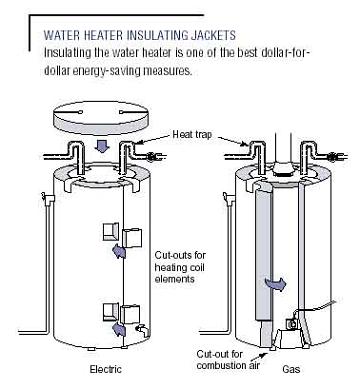Water Heating
Water heating is the third largest energy expense in your home, after heating and cooling. More than 50 percent of the hot water is used in the shower and clothes washer. Here are a few ways to save energy and cut down on the amount of money spent on water heating.
-
Focus on Your Water Heater

Wrap the outside of the water heater tank with an insulation jacket. They are inexpensive, easy to install, and can be found at any home improvement or hardware store. During installation, do not cover the emergency pressure relief valve, drain valve, thermostat, or access panels. Insulate the first three to four feet of the cold and hot pipes connected to the unit.
- Lowering the temperature setting on the water heater to 120°F also saves energy. For every 10 degree reduction in temperature, energy consumption can be reduced by three to five percent.
- Drain about a gallon of water from the tank bottom spigot once a year. This will remove sediment that can increase the time it takes to heat water and increase tank corrosion.
- Check the emergency pressure relief valve and line. If the pipe is warm more than 18 inches away from the tank, you may have an energy (and money) wasting leak, which should be repaired quickly.
- Check with your electrical utility company to see if they offer lower rates for off-peak hours electrical usage. Some companies offer incentives for customers who permit control devices to be installed that shut off water heaters during peak demand hours.
-
Alternative Heating Methods
- Solar water heating | This system uses solar energy to heat water. There are two types of solar heating systems: active and passive.
- Waste heat recovery units (HRU) | This system operates with the central air conditioner or heat pump by recovering heat normally exhausted to the outdoors. As long as your central air system is operating, the extra heat is used to heat water. Installation is about $300-$500, but can save you $100-$140 a year. That's 50 percent of your home's heating costs.
- Heat pump water heater (HPWH) | This system extracts heat directly from the air and transfers it to water in a stored tank. The system operates independently of the central air system, so it can produce hot water all year long. Retrofitting an existing water heater can cost about $600-$1000, but it can save you $100-$150 a year.
- Demand (tankless or instantaneous) water heaters | This system heats water directly without the use of a storage tank. Therefore, they avoid the standby heat losses associated with storage water heaters. When a hot water tap is turned on, cold water travels through a pipe into the unit. Either a gas burner or an electric element heats the water. As a result, demand water heaters deliver a constant supply of hot water. You don't need to wait for a storage tank to fill up with enough hot water.
Check with your local utility company for alternative heating method rebate offers and contractor and installation information.
Additional Resources
- Tips on Saving Energy and Money at Home
- EnergyStar
- Florida Energy Extension Service
- Florida House Learning Center
- Florida Solar Energy Center
- Office of Energy Efficiency and Renewable Energy | U.S. Department of Energy



